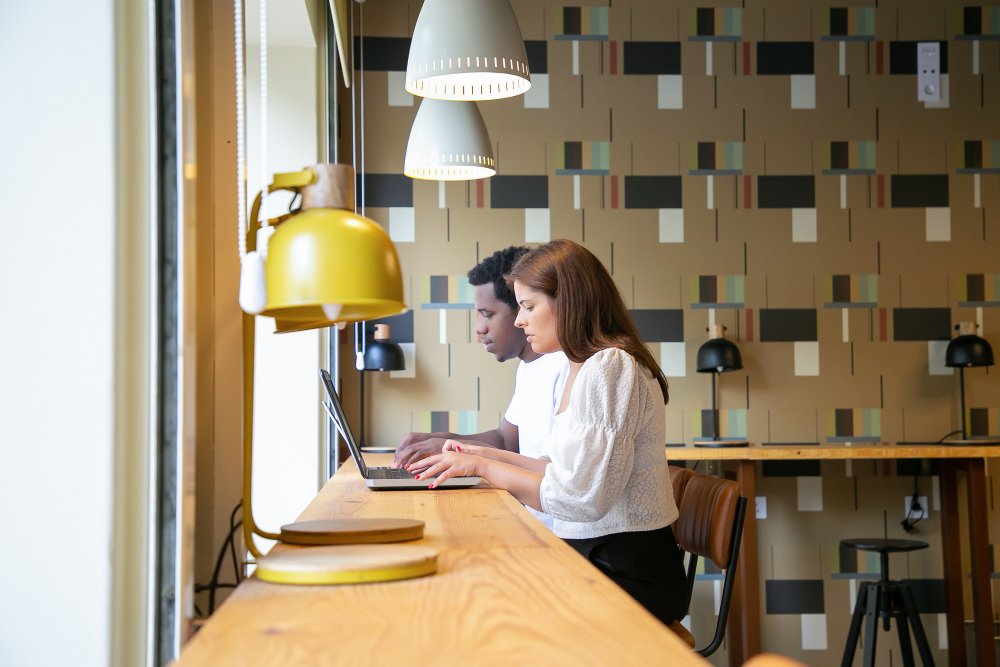
The landscape of work is undergoing a seismic shift, with the traditional office model giving way to a more flexible and dynamic hybrid model. This shift isn't just about where we work but how we can make the best of both physical and remote work scenarios. Creating a successful hybrid workplace design is more than just rearranging desks; it's about fostering collaboration, ensuring well-being, and creating an environment that adapts to the needs of a diverse workforce.
Defining the Hybrid Workplace
The hybrid workplace combines the best of both worlds: in-office collaboration and remote work flexibility. It's a workplace model that allows employees to choose where and how they work, often incorporating an element of choice and autonomy. For companies around the world, this flexible approach has become vital in attracting and retaining top talent, proving crucial during the global shift brought on by the COVID-19 pandemic.
Navigating the Underlying Challenges
Designing a hybrid workplace isn't without its challenges. From the technological and logistical hurdles of accommodating remote work to the psychological and cultural shifts required to maintain a cohesive company identity, the hybrid workplace demands careful consideration.
Balancing Act of Flexibility
One of the main challenges in creating a hybrid workplace is the need to balance the flexibility that remote work affords with the structured environment of the traditional office. This requires a thoughtful approach to design that can accommodate a variety of work styles. Modular furniture is a solution that allows for quick adjustments and personalization, no matter where work takes place.
Technology Integration
Making technology a seamless part of the workday is essential. IT infrastructure must support the needs of employees at home and in the office. Integrating furniture solutions with smart technology can enhance connectivity and adaptability, creating a tech-enabled environment that is both efficient and supportive.
Cultural and Team Cohesion
With a portion of the workforce operating remotely, maintaining a strong company culture and team cohesion can be challenging. Designing spaces that encourage both formal and informal interactions is key. Consider incorporating open collaboration areas, video conferencing pods, and decentralized lunchrooms to keep the human element of work alive.
Best Practices in Hybrid Workplace Design
A successful hybrid workplace provides the infrastructure and support necessary for employees to be productive, collaborative, and well-connected, regardless of their location.
The Physical Environment
The physical workspace plays a critical role in the hybrid model. It should be flexible, supportive, and reflective of your company's brand and values. Look for furniture and layouts that can be easily reconfigured to cater to different uses, from individual focused work to team meetings and social gatherings.
Ergonomics and Well-being
Ergonomic considerations are crucial, especially for remote workers who may not have access to the same office comforts. Consider providing guidelines and resources for setting up a comfortable home office, as well as ergonomic furniture solutions that support health and well-being.
Encouraging Collaboration
Creating a sense of community and collaboration is vital in a hybrid setting. Use design to encourage regular and spontaneous interactions, such as setting up a 'town hall' style area for company-wide meetings, or creating a digital platform that fosters team-sharing and social connection.
Leveraging Smart Technology
Incorporate tech solutions that enable a seamless transition between in-person and remote work. This might include cloud-based systems, virtual private networks (VPNs), and software for managing office space, desk booking, and meeting room availability.
Sustainable Design
Sustainability is more than a trend; it's a necessity. Adopt green design strategies that reduce your environmental impact, like energy-efficient lighting and HVAC systems, or using materials that support responsible sourcing and recycling.
Implementing Your Hybrid Workplace Design
Once you've planned the ideal space, the next challenge is bringing it to life. Implementing a hybrid workplace design requires coordination and expertise in areas such as project management, procurement, and installation.
Partnering with Professionals
Working with professionals in workplace design, such as interior architects and space planners, can ensure that your vision is realized effectively. For a cost-effective and rapid setup, you might also consider modular furniture installation services, like those provided by 360 Modular Furniture Installation in Orlando, FL.
Employee Involvement
Employees are at the heart of the hybrid workplace design. Involving them in the process, through surveys or design thinking workshops, can provide valuable insights and create a sense of ownership over the new work environment.
Ongoing Evaluation and Adaptation
The hybrid workplace is a fluid concept, and your design should be too. Regular evaluation and feedback from employees can identify areas for improvement and keep your workplace design relevant and effective.
The Future of Work is Here
The shift to a hybrid workplace is not merely a response to current global circumstances; it is the future of work. By designing an environment that promotes flexibility, engagement, and connection, you set your organization on a path to thrive in the long term.
Whether you're a start-up looking to create your first office space or a global business reimagining your existing workplace, the potential for a well-designed hybrid workplace is immense. It offers the opportunity to innovate, to redefine the work experience, and to foster a culture that values both the individual and the collective.
If you're ready to take the next steps towards a more flexible and efficient work environment, connect with 360 Modular Furniture Installation in Orlando, FL. Their team of experts can provide the support you need to bring your hybrid workplace design to life efficiently and in line with current trends and best practices. Contact them today for a consultation or to request a free quote.